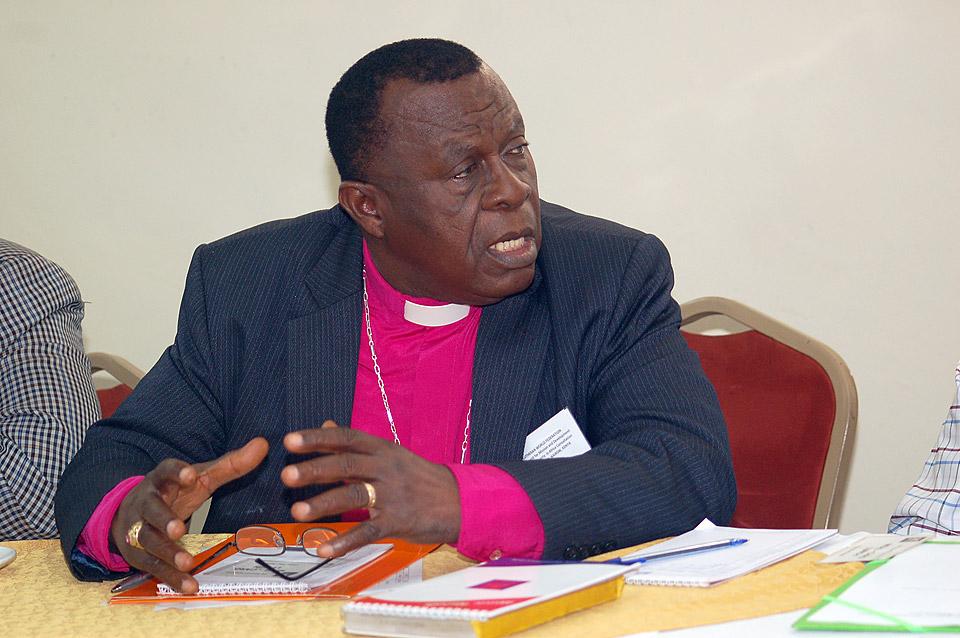We Need to Act on Poverty, African Lutheran Diaconal Workers Say

Ghanaian Bishop Dr Paul Kofi Fynn, moderates one of the sessions at the LWF consultation on
LWF Task Force on Poverty Maps Out Action Plan
A consultation of The Lutheran World Federation (LWF) in Nairobi, Kenya, heard how churches’ support and collective action by community-based organizations are helping small-scale farmers in many parts of Africa fight poverty and create opportunities for economic empowerment.
One of the initiatives cited at the 22-25 April consultation on “Confronting Poverty and Economic Injustices in Africa” was the work of the National Smallholders’ Farmers Association of Malawi (NASFAM), which in 2009 received the Yara Green Revolution Award for its outstanding efforts to increase food production among farmers, majority who are women.
“Our small-scale farmers lack farm inputs and NASFAM has been helping them get the inputs, including seeds and fertilizers, and providing technical support throughout the process. After that the association helps in marketing the produce,” Mr Steven Kaseko from the Evangelical Lutheran Church in Malawi (ELCM) said at the consultation organized by the LWF Department for Mission and Development (DMD) to review the work of the LWF Task Force on Poverty.
The group which comprises ten diaconal workers from Cameroon, Ethiopia, Ghana, Kenya, Liberia, Malawi, South Africa, Tanzania and Zimbabwe explored further how LWF member churches in Africa can jointly formulate tangible and workable measures to address poverty and food insecurity on the continent.
Like in Malawi, the Evangelical Lutheran Church of Ghana (ELCG) extends financial support to church members who are in need, which includes setting up food points known as chop bars. “There is a woman we [ELCG] gave USD 100 to set up a chop bar. She has built a house out of that money and educated her children,” Bishop Dr Paul Kofi Fynn told the consultation. Such efforts are improving living conditions, keeping children in school and empowering women, he emphasized.
Participants emphasized the need to share and learn from the numerous simple yet practical efforts by civil society and African churches aimed at uplifting marginalized people from poverty. Other church-supported income-generating initiatives discussed included the Basic Income Grant project in Namibia, and the distribution of heifers among small-scale women farmers in Tanzania.
Need for Strong Advocacy
They noted however that while several countries on the continent are recording fast growing economies, the wealth is not trickling down to the ordinary poor at the grassroots, and strong advocacy was needed to deal with this challenge.
In Liberia, civil society is demanding accountability for the gains made from the country’s vast natural resources, Bernice Womba from the Lutheran Church in Liberia said. After decades of mining diamonds, gold and iron ore, and exporting rubber and palm oil, ordinary people remain very poor and excluded. “The people now feel the discovery of oil deposits in 2012 will bring more money than any other mineral. But their worry is that decisions [will be made] that are not in the interest of the poor,” she added.
The LWF church representatives also discussed the widespread practice by African governments to lease “so-called unproductive land” to multinational companies to cultivate food or cash crops for export under the guise of creating local employment opportunities and generating government revenue. This new development will further impoverish the communities and deprive them of land—their key source of livelihood, the task force members emphasized.
“The Lutheran churches in Africa need to act continuously through tactful and strategic advocacy for the poor who are losing their last asset, land, which all along has defined and dignified them,” said Mr Geoffery Kalugendo from the Evangelical Lutheran Church in Tanzania.
Bishop Fynn, who is the chairperson of the LWF Task Force on Poverty, urged African Lutheran churches to set up their own income-generating projects such as schools, conference centers, hotels and farms. “If churches’ anti-poverty efforts are to succeed, then the leaders need to believe they can fund the projects through their churches,” he added.
African Lutheran Communication Network
An LWF-led workshop for a core group of the Africa Lutheran Communication and Information Network (ALCINET) coincided with the LWF task force consultation. The eight-person ALCINET group agreed to focus on sharing information within the region about the good practices and challenges on fighting poverty and the impact of climate change on livelihoods in Africa.
Rev. Dr Elieshi Mungure, LWF area secretary for Africa said the consultation “has enabled the task force to understand the new realities that hinder community empowerment and also learn that it is possible to tackle poverty and the underlying economic injustices.”
The action plan by the poverty task force includes measures to enhance local communities’ capacities to produce food, create better access to land use, promote advocacy for environmental care and sustainability, and enhance gender and generational equality in sharing of resources and means of production, Mungure said.
(By LWI correspondent Fredrick Nzwili)

